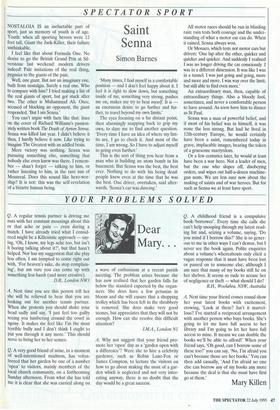SPECTATOR SPORT
Saint Senna
Simon Barnes
NOSTALGIA IS an ineluctable part of sport, just as memory of youth is of age. Youth: when all sporting heroes were 12 feet tall, Giant the Jack-Killer, their failure unthinkable.
I feel like that about Formula One. No desire to go the British Grand Prix at Sil- verstone last weekend: modern drivers indeed! Pale imitations of the real thing, pygmies to the giants of the past.
Well, one giant. But not an imaginary one, built from nostalgia. Surely a real one. Who to compare with him? I tried making a list of the real giants of sport, but got stuck after two. The other is Muhammad Ali. Once, accused of blocking an opponent, the giant responded, 'But I am Senna.'
You can't argue with facts like that: lines on the cover of Richard Williams's passion- ately written book The Death of Ayrton Senna. Senna was killed last year. I didn't believe it then, I hardly believe it now. Like trying to imagine The Greatest with an addled brain.
Mere victory was nothing. Senna was pursuing something else, something that nobody else even knew was there. I remem- ber — shan't forget — talking to him, or rather listening to him, in the rare sun of Montreal. Does this sound like hero-wor- ship? It is not: this was the self-revelation of a bizarre human being. 'Many times, I find myself in a comfortable position — and I don't feel happy about it. I feel it is right to slow down, but something inside of me, something very strong, pushes me on, makes me try to beat myself. It is — an enormous desire to go further and fur- ther, to travel beyond my own limits.'
The eyes focusing on a far distant point, then alarmingly snapping back to grip my own, to dare me to find another question. 'Every time I have an idea of where my lim- its are, I go to check it. And most of the time, I am wrong. So I have to adjust myself to going even further.'
This is the sort of thing you hear from a man who is building an atom bomb in his basement. But Senna was the best, the best ever. Nothing to do with his being dead: people knew even at the time that he was the best. One driver, overtaken, said after- wards, `Senna's car was dancing.' All motor races should be run in blinding rain: rain tests both courage and the under- standing of what a motor car can do. When it rained, Senna always won.
Or Monaco, which tests not motor cars but drivers: 'One lap after the other, quicker and quicker and quicker. And suddenly I realised I was no longer driving the car consciously. I was in a different dimension. It was like I was in a tunnel. I was just going and going, more and more and more. I was way over the limit, but still able to find even more.'
An extraordinary man, then, capable of extraordinary things. Also a bloody fool, sometimes, and never a comfortable person to have around. As soon have him to dinner as St Paul.
Senna was a man of powerful belief, and if most of his belief was in himself, it was none the less strong. But had he lived in 12th-century Europe, he would certainly have been a saint, remembered today in grave, implacable images, bearing the token of a gruesome martyrdom.
Or a few centuries later, he would at least have been a war hero. Not a leader of men, but the one who slopes off, disobeying orders, and wipes out half-a-dozen machine- gun nests. We are less sure now about the making of saints and of war heroes. But for such as Senna we at least have sport.


















































 Previous page
Previous page